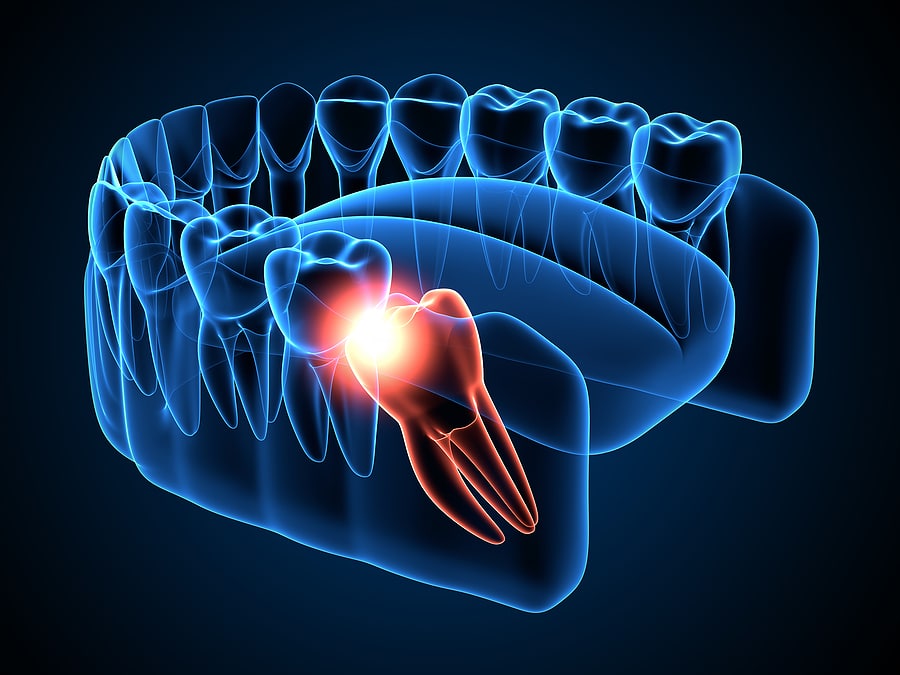We Can Help With Painful, Impacted Wisdom Teeth.
Lakeway Cosmetic Dentistry offers wisdom tooth extraction surgery in Lakeway, Texas.
Wisdom teeth are your third molars and the last permanent teeth that grow out between ages 16 and 18. By age 25, these wisdom teeth mature, and how they settle varies between individuals. Sometimes they can become impacted wisdom teeth and cause dental problems. For such cases, we offer wisdom teeth removal surgery to ease pain and pressure.
Are you interested in wisdom teeth removal? We are the best dentist office in Central Texas, choose Lakeway Cosmetic Dentistry!
- 2-Week Average Healing Time
- FREE Consultation
- CareCredit Partner
- Payment Plans Available
Do You Have Impacted Wisdom Teeth?

What does it mean to have impacted wisdom teeth?
Impacted wisdom teeth happen when they fail to grow in their natural position. They will either become enclosed within the soft tissue of the jawbone or emerge only slightly. If partially erupted, bacteria can enter your wisdom tooth area and cause infection, or it can suffer from cavities and gum disease since the area will be hard to brush and floss.

How does a wisdom tooth become impacted?
Common conditions why your wisdom teeth may become impacted include:
- Slow eruption of these teeth
- Getting partially stuck below soft tissue
- Settling lower than adjacent teeth
- Erupting in an angle against adjacent teeth
- Over-eruption of top wisdom teeth in absence of lower teeth
How do you decide if you need a wisdom tooth extraction?

Wisdom teeth removal is only necessary if it is hurting your oral health, such as when they become impacted teeth. We encourage you to visit our dentists in Lakeway and get our dentist’s recommendation first before booking your appointment with our oral surgeon. During your consultation, we can help you determine if you have healthy and normal wisdom teeth and do not need surgery.If you answer “Yes” to any of these conditions, you might be a candidate for wisdom teeth surgery:
- Do they cause pain?
- Are they decaying and cannot be reached for cleaning?
- Do they pose a risk of affecting or damaging adjacent teeth?
- Can they weaken the jaw or increase the risk of jaw fracture?
Lakeway’s Top Wisdom Tooth Extraction Team

Meet Our Oral Surgeon
Working with Lakeway Cosmetic Dentistry Since 2010
Founder of Lakeway Cosmetic Dentistry, Dr. Robert D’Alfonso is a leader in the cosmetic dentistry industry. A sustaining member of the American Academy of Cosmetic Dentistry, Dr. D’Alfonso strives for perfection and goes far beyond the average dental training. Dr. D’Alfonso upholds his credit certifications in various areas of general and cosmetic dentistry and is therefore able to deliver the safest and most innovative treatments to his patients in the Lakeway area.
What Can You Expect During Wisdom Teeth Removal?

Before Surgery
Take this time to ask questions or speak to your oral surgeon about any concerns you may have. Be sure to not consume any food 6-8 hours before your surgery and prepare soft meals for the next coming weeks.

During Surgery
The actual tooth extraction is a procedure done in about an hour. Depending on the severity of the impacted tooth, some patients may get local anesthesia, intravenous sedation, or general anesthesia.

After Surgery
You will have to bring either a parent, legal guardian, or caretaker to help you in your post-op care, including leaving the dentist’s office. They will help ensure your safety as the anesthesia takes time to wear off.
For more detailed information, jump to our “Everything You Need to Know & Prepare for Your Wisdom Tooth Removal” section below.
How Much Does Wisdom Tooth Removal Cost?
Affordable Rates and Insurance Accepted
At Lakeway Cosmetic Dentistry, we offer several payment options for wisdom teeth surgery. We accept most major dental insurance plans, offer in-house dental insurance plans, and can also help you finance any out-of-pocket expenses through our partner CareCredit. See our finance page or visit our dentists in Lakeway for more information.
Testimonials
“I had my wisdom teeth extracted two weeks ago here and I must say that it went way smoother than I thought it would… It was all over in about an hour and they even filled a cavity for me… Overall, great price and excellent service!”
Anonymous
“Everyone in my family has had work done here. All of our procedures have been done quickly, and each done with a personal touch. I recommend this office to anyone that wants a great experience from everyone that works there.”
Christine S
“Thank You. Major dental work was handled not just with extreme professionalism, but with a caring and sensitive attitude. Every effort was made to make sure I was comfortable and at ease. As good as it gets, in my opinion.”
Joyce D.
Wisdom Tooth Pain? We Can Help.
If left untreated, an erupting wisdom tooth can cause overcrowding, misalignment, and extreme discomfort. Visit our oral surgeon in Lakeway to learn more about your options and find relief as soon as possible!
Everything You Need to Know & Prepare for Your Wisdom Tooth Removal
Before Surgery
Prepare your food for the coming weeks.
While you might be able to go back to your regular schedule in 24-48 hours, you will be on a restrictive diet to ensure proper healing and will most likely feel sluggish. To make sure that you have enough nutrition during this time, stock up on soups, soft foods, water, and other beverages that can replenish your electrolytes.
Don’t consume food 6-8 hours before your surgery.
Depending on the anesthesia used, it is important to avoid consuming any food for 6-8 hours before your scheduled surgery to prevent any side effects that can occur during the surgery.
After Surgery
Have a parent, guardian, or caretaker with you when you arrive for surgery.
You will still experience anesthesia effects post-surgery and may need help walking or operating a vehicle. It’s important to have a capable adult assist you afterward to take you home and to ensure that you are safe.
Eat only when you are fully alert.
Make sure that you are fully aware before attempting to eat to prevent any injury that can occur, like biting your lips, tongue, cheeks, gum, or teeth while numb.
Eat nutritious and soft foods.
Maintain your body’s health to allow healing to occur without any setbacks. After the wisdom teeth surgery, you might not feel like eating at all, but it will be necessary to drink water and eat soft food such as milkshakes or smoothies.
Within 24 Hours of Surgery
While the anesthesia begins to wear off, ensure you are not operating any vehicles or participate in activities that will require too much energy.
Change your gauze every 30 minutes for the first few hours.
You can expect bleeding to occur. Use a new gauze every 30 minutes until bleeding slows or stops completely to help form a blood clot and will start your gum’s healing process. It is normal to see blood or a red tinge in your saliva for a day or two, and with time this will clear up.
Apply ice packs for 10 minutes every 30 minutes.
Inflammation will occur around your cheek and jaw area, and even some slight bruising can happen. To reduce inflammation, apply ice packs to your cheeks for 10 minutes at a time every 30 minutes to constrict the blood vessels and reduce any bleeding that might occur.
Do not wash your mouth at all.
Do not wash your teeth or mouth at all during the 24 hours after surgery. This time frame is essential for recovery, and any rinsing can stop a blood clot from forming or disturb any stitches, thus resulting in a painful dry socket. Focus on resting, drinking water in small sips from a glass, and eating food that doesn’t require chewing.
. Take your antibiotics as prescribed.
Your dental surgeon will prescribe antibiotics to avoid any infection during the healing process. Please take them as directed to avoid any complications.
Take pain medication.
Your dental surgeon will also prescribe pain medication to help relieve pain, swelling, and bruising. Depending on the medication, follow the instructions to reduce any feelings of discomfort.
You may experience numbness and nausea.
Numbness is normal after wisdom tooth surgery and will wear off within 24 hours, but swelling and numbness can occur for up to 7 days due to the recovery of nerves in the jaw. If numbness is still present after a week, contact us. Nausea may occur if you take pain medication on an empty stomach. Try to take some food with your medication to avoid any nausea.
Lakeway Cosmetic Dentistry Post-Op Care for Wisdom Tooth Removal
Week 1
Apply heat packs to reduce swelling.
Expect swelling after your wisdom tooth surgery. Ice packs can help during the first 24 hours, but then use hot packs for 10 minutes every 30 minutes to help reduce swelling. Any swelling should reduce in 3 days, but please come into our dentist’s office in Lakeway for a thorough exam if swelling persists.
Ice packs work during the first 24 hours by constricting the blood vessels to reduce the amount of blood going to the tooth extraction site. Once bleeding has stopped, heat pads are much more useful to help open the blood vessels and allow blood flow again.
Begin rinsing after 24 hours.
After the first 24 hours, you’ll need to rinse your mouth regularly with a prescribed mouthwash to eliminate bacteria near your extraction site to keep it clean. If not prescribed, you can also use an at-home salt solution. Mix a ¼ of a teaspoon of salt with one cup of water to create the saltwater.
Do not swish the solution since it could dislodge the blood clot or disturb any stitches. Insert the saltwater in your mouth and tilt your head from side to side carefully before opening your mouth and allowing the water to drip out. Spitting can disturb the blood clot and lead to a dry socket.
Irrigate with water properly.
Your gums will heal from the bottom up, gradually filling the area with healthy tissue. Without proper irrigation, food particles can get stuck in the surgery site and can lead to irritation and discomfort.
We will provide you with a syringe and instruct proper use for irrigation. Use with saltwater, prescription mouthwash, or lukewarm water. Fill the syringe and gently place the tip to the side of the extraction site and slowly allow the substance to fill the hole to help flush out any food that might have gotten stuck without disturbing the blood clot formation.
You may see white tissue form on your gums.
This scar tissue is a natural response by the body that indicates that proper healing. As the days go by, the white tissue will fall off with continual salt rinses.
Introduce soft foods slowly.
To ensure a smooth recovery, continue eating foods that do not require chewing to avoid irritating the healing area. Prevent any food from becoming lodged and will reduce the likelihood of you getting an infection.
Hydration and maintaining a healthy diet are essential during this stage, so make sure you are consuming an adequate amount of food.
Avoid a dry socket.
Dry socket most commonly occurs 3-5 days post-surgery, although it is still possible depending on the extraction procedure. We recommend not sucking on a straw, spitting, or cleaning your teeth vigorously for a full week after since these could cause the blood clot to dislodge.
Learn more about dry sockets here.
Go for a post-operative appointment.
Most patients experience healthy recovery during the first week, but we may recommend a follow-up appointment to assess how you are healing. We will check the area and provide instructions for further water irrigation. We will also share this information before your surgery.
You may experience some bruising.
Bruising may occur in the cheek, eyelids, chin, and neck between 7 to 14 days and should decrease gradually.
Week 2
Continue eating soft foods and avoid crunchy foods.
Eat soft foods for two weeks and gradually re-introduce solid food into your diet. You may crave crunchy foods such as chips, but we strongly recommended that you wait at least until the end of the 2nd week to allow for full healing of the jaw or tooth.
You will see gum tissue begin to cover the area.
Your gum tissue will heal at a rapid rate by the 2nd week, and the extraction site should show significant improvement. However, if you had impacted teeth, the healing process may be slower, and it will be normal to see holes for a few more weeks.
Week 3 & Beyond
The extraction site will be covered by tissue.
Over the next couple of weeks, your gum tissue will completely cover the socket where the tooth was, although it might still be tender to the touch. Be careful and avoid poking or stabbing the area with a toothbrush, pointy food, or other hard materials and prevent irritation or bleeding.
Some patients may take more time to heal, especially those who are older or had impacted wisdom teeth. In such cases, 3-6 weeks are often necessary to see the site heal significantly.
Your bone will take time to heal completely.
The bone beneath the gum will take about 6 to 8 months to heal entirely, with most patients seeing no evidence of the extraction site.
You may experience numbness in your jaw or cheek.
Numbness may occur as a result of potential nerve damage and will heal in the coming weeks or months. Feelings of tingling are a good sign that the nerve is healing. If there is any concern, make sure to come in for an appointment as soon as possible.
Are you experiencing wisdom tooth pain?
Don’t let pain hold you back. Request your complimentary dental consultation and schedule your wisdom tooth surgery with Lakeway Cosmetic Dentistry.



 We will create a personalized
We will create a personalized View your video and schedule an
View your video and schedule an